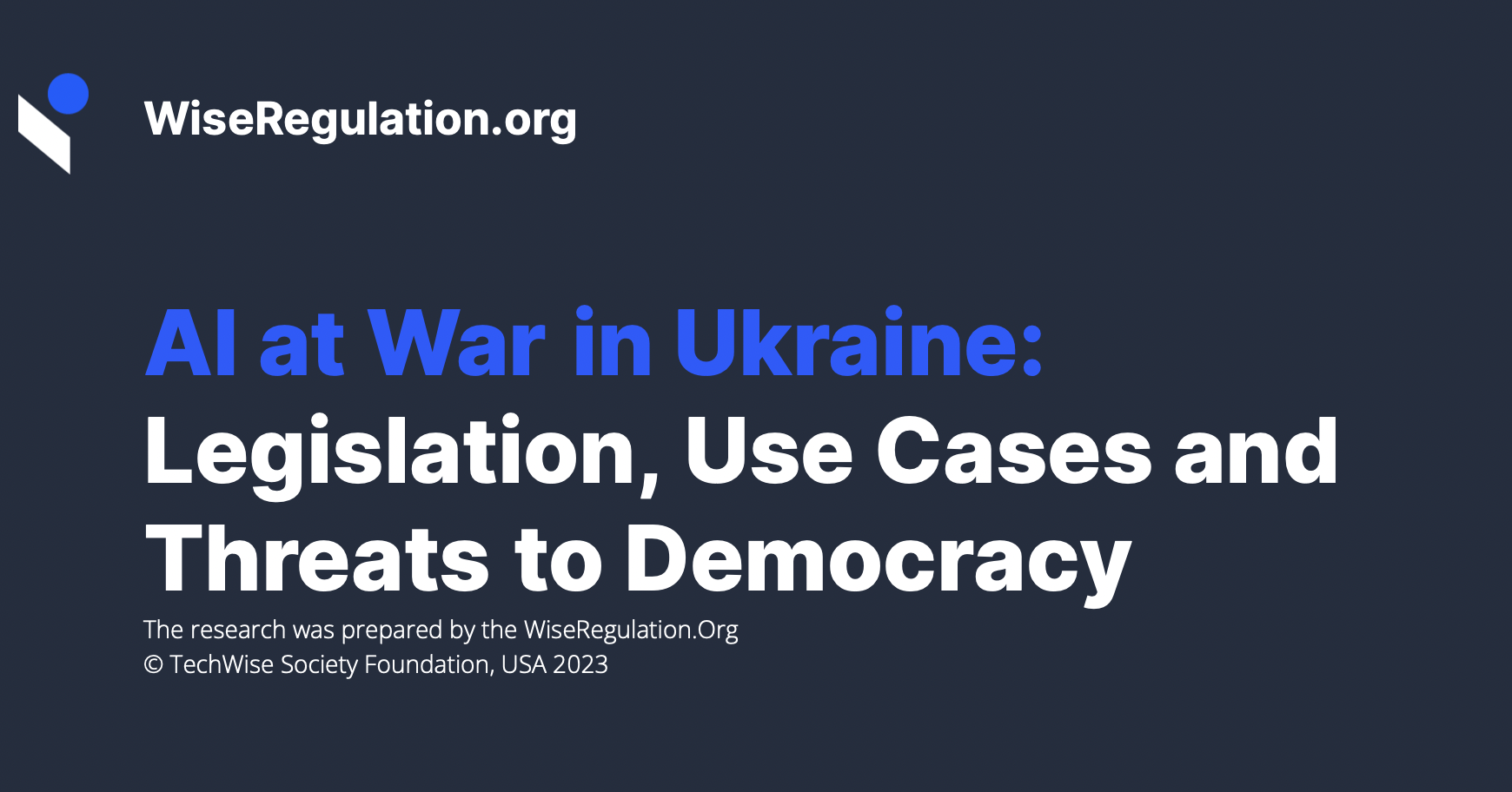AI at War in Ukraine: Legislation, Use Cases and Threats to Democracy
07. 07. 2023

Any war is an extremely radical stress test for state institutions, social norms, legislation, and society itself .
Our researchers investigated the situation with the regulation and use of AI during the war in Ukraine, as this is one of the first conflicts of our time, in which AI technologies began to be massively applied and became one of the decisive factors.
The practical results of using AI in Ukraine will influence subsequent military conflicts and global approaches to regulation for decades.
You find full research with a list of 30+ use cases, our analysis of problems and legislation in this presentation(LINK).
In this summary, we want to share some key insights and takeouts:
- AI testing ground: During the years of war, Ukraine has turned into a testing ground for a very wide range of AI products developed by both local and international companies – from autonomous drones to satellite data analysis systems, etc.
- Outdated legislation: At the time of the invasion on 24 February 2022, the country had only adopted a conception on AI at the government level, which was prepared by a group of enthusiasts within an advisory body. Relations in the sphere of protection of state secrets are regulated by the Constitution of Ukraine, the Laws of Ukraine “On Information” and “On Access to Public Information,” as well as the Law “On State Secrets.” The legislation regulating access to personal data and access to public information mentioned before was adopted back in 2010.
- “Legislation against Ukraine”: As of the date of the invasion, it can be stated that the legislation of Ukraine on the regulation of access to data played into the hands of its opponent – russia. As it hindered or even considered illegal the development of most AI solutions, which, as events in 2022-2023 showed, significantly improved the competitiveness of the Ukrainian army in comparison with russia.
- Outdated weapon acceptance standards: At the time of the invasion, the existing legal frameworks did not allow for the rapid acceptance of autonomous drones, robots, and other AI solutions into military service, access to the collected information for quick training of AI algorithms for targeting, etc. (developers created these solutions often under the threat of criminal liability).
- Privacy violations: As of now, government agencies have accumulated significant amounts of information about citizens, which in many respects violates basic privacy laws and requires the development of additional legislation that will regulate the non-use of this data in peacetime and/or the need to control the removal of this data after the end of the war.
- AI regulation in countries with ongoing conflicts: Global approaches to AI regulation are obviously not adapted for democratic countries that are in conflict (Ukraine, Israel, South Korea), so it makes sense to regulate AI, privacy, etc. in such countries, taking into account their specific condition. Given that Ukraine has committed to adopt its legislation with the EU, it will be necessary to take into account the constant threat of conflict in the future, and not just copy-paste the legislation of peaceful EU countries.
- Global Deregulation of AI and simplification of requirements in the acceptance of weapons: Against the backdrop of the war in Ukraine, we are already seeing serious discussions in the United States, Japan and the UK about the need to revise and simplify the norms and requirements in the acceptance of weapons, and simplify the regulation of AI and privacy.
According to the results of our research, we can say that since the beginning of the war in critical situations, people and key institutions in Ukraine have basically stopped paying attention to inefficient and outdated legislation that hindered the development of AI solutions before, and began to be guided by common sense, making everything to defeat the enemy “today.”
At the same time, with the transition of the conflict into a more protracted one, the leadership of Ukraine will need to radically update the regulations and legislation in many areas, including AI, as well as access to state secrets and privacy.
Otherwise, the country’s defense and competitiveness may suffer significantly in the next 2-3 years.
However, according to the history of civilization, usually after wars the regime of countries changes from more democratic to more authoritarian.
So, public institutions should increasingly and actively monitor changes in legislation and the development of new technologies based on the accumulated data on citizens during the war, so that instead of improving the country’s defense capability, they do not get autocracy based on AI tools to effectively manipulate society.
You can find full research with a list of 30+ use cases, our analysis of problems and legislation in this presentation(LINK).
Best regards,
Vitaliy Goncharuk
WiseRegulation.org